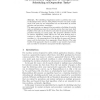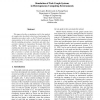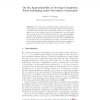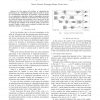ACMICEC
2007
ACM
14 years 9 months ago
2007
ACM
This paper presents a decentralized task allocation method that can handle allocation of tasks with time and precedence constraints in a multi-agent setting where not all informat...
DATE
1997
IEEE
14 years 9 months ago
1997
IEEE
This paper describes new algorithms for systemlevel software synthesis, namely the scheduling and allocation of a set of complex tasks running at multiple rates on a heterogeneous...
IPPS
1998
IEEE
14 years 10 months ago
1998
IEEE
The scheduling of application tasks is a problem that occurs in all multiprocessor systems. This problem becomes even more complicated if the tasks are not independent but are inte...
HCW
1999
IEEE
14 years 10 months ago
1999
IEEE
This paper describes a simulation tool for the analysis of complex jobs described in the form of task graphs. The simulation procedure relies on the PN-based topological represent...
ICALP
2001
Springer
14 years 10 months ago
2001
Springer
Abstract. We consider the scheduling problem of minimizing the average weighted job completion time on a single machine under precedence constraints. We show that this problem with...
ASPDAC
2004
ACM
14 years 11 months ago
2004
ACM
Improving logic capacity by time-sharing, dynamically reconfigurable FPGAs are employed to handle designs of high complexity and functionality. In this paper, we use a novel topo...
SPAA
2005
ACM
14 years 11 months ago
2005
ACM
We describe a new class of utility-maximization scheduling problem with precedence constraints, the disconnected staged scheduling problem (DSSP). DSSP is a nonpreemptive multipro...
ICTAI
2006
IEEE
14 years 11 months ago
2006
IEEE
Precedence constraints play a crucial role in planning and scheduling problems. Many real-life problems also include dependency constraints expressing logical relations between the...
ICRA
2006
IEEE
14 years 11 months ago
2006
IEEE
— In this paper, the problem of optimizing the performances of a distributed supply chain is faced by means of a decentralized architecture. In particular, a general scheme for a...
REFSQ
2007
Springer
14 years 11 months ago
2007
Springer
This paper investigates two integer linear programming models that integrate requirement scheduling into software release planning. The first model can schedule the development of ...




